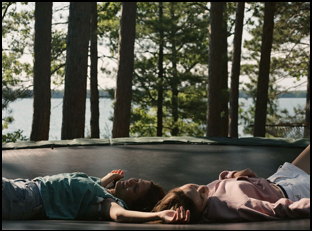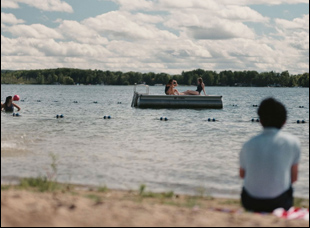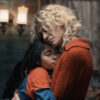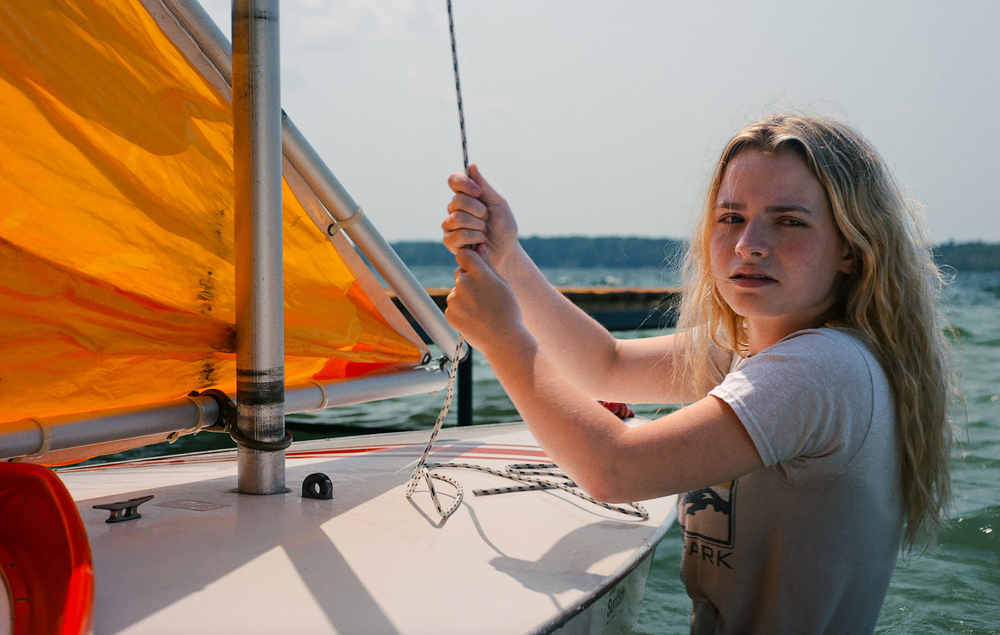When Sierra Falconer grew up around the water in Michigan, it was not difficult to see the ebbs and flows outside as an extension of all the emotions she felt as she came of age, an observation that gave an unorthodox shape to her debut feature “Sunfish (& Other Stories on Green Lake).” Comprised of four short vignettes connected largely by a tributary, the crisp air seems as if it’s emanating from the screen not only when the natural beauty of the northeast is on full display, but the refreshing quality of the storytelling as Falconer finds a 14-year-old (Maren Heary) unhappy to be sent to her grandparents’ place for the summer until her interest is piqued in taking her grandfather’s dinghy for a spin, a violin prodigy (Jim Kaplan) discovers his talent is alienating as he tries to make friends at a prestigious arts school where attaining first chair for a recital is everyone else’s goal but his, a college dropout (Karsen Liotta) seems resigned to a future tending bar until a stranger’s search for a rare fish revives her passion and a pair of sisters (Emily Hall and Tenley Kellogg) prepare to part ways for the extended period of time in their lives as college beckons for one of them.
If nothing else, the offer of 90 minutes in such idyllic surroundings proves entirely irresistible, but Falconer finds enchantment as much in people as places when it will often take a gentle nudge from someone to see their own potential and as much as they’re capable of breaking your heart, particularly when you’re young, they could hold the key to mending it as well. It isn’t just the decision to make an anthology film for her debut that seems like a sign of great confidence from the filmmaker, but the way she guides its gentle spirit and works with a talented ensemble across the four short stories to achieve the same magical tone, suggesting all the adventures happening in your own backyard if you can spare the time to look. With “Sunfish” set to make a splash when it premieres this weekend at Sundance, Falconer as well as a few of the film’s stars including Liotta, Hall and Kellogg graciously took the time to talk about how the production itself was a formative experience, having nature on their side (most of the time) and the sweet spot between dreams and reality.
 Sierra, how did you figure out the best way to share this experience was through four short stories like this?
Sierra, how did you figure out the best way to share this experience was through four short stories like this?
Sierra Falconer: The way into the structure was just by necessity. I felt like it was the only way to tell this story well, and what was so important to me was to capture what it feels like to be here and to live here and grow here. So I chose the stories in service of place and was trying to find little different moments of growth in each character that I felt were really true to my experience growing up there.
What got all of the actors excited about this?
Karsen Liotta: Just the script itself. Sierra is such a brilliant writer and I thought every character was brilliantly written and mine specifically, when I was reading it, I [thought] “I get it and I love it.”
Tenley Kellogg: When I first read my story, I could immediately picture the entire film in my head and I could see this film exactly through Sierra’s eyes. That got me really excited. Plus, I’m I’m originally from Michigan, and I moved out to California to move back to Michigan to then go to Sundance, which I think is one of the coolest things ever. Then I got to meet this amazing person [Emily Hall] who I get to call my film sister and is an amazing scene partner on set. Just getting to meet everybody on this film made me incredibly excited to be a part of this.
Emily Hall: Yeah, it was similar for me where I read the script and instantly [thought], “I want to be in this.” I had auditioned for two characters and I remember writing Sierra a note [about] why I connected to my character so much because I just thought it was so honest and real. I could see it all and feel the relationship in the writing, so that made me really excited and when I read with Tenley, I [thought], “I really want this now.”
Sierra, was there anything you could get excited about seeing the actors make the characters their own or their dynamics?
Sierra Falconer: After I cast, I always return to the script and do script tweaks once I have their voice in my head, so it was just little dialogue tweaks and I don’t like to do too many rehearsals. Actually, a lot of our planned rehearsals were canceled because the SAG strike leading into the film, but I trust my actors to find [the characters] themselves and once we were on set, do the work there because that’s when the magic happens. You don’t want to do too much work ahead of time. Otherwise it might feel too rehearsed, so everyone did such an amazing job and I’m just so happy with how it all came together.
Tenley Kellogg: The relationship that me and Emily built together over those three weeks [on the set] was key because that relationship plays into a lot of who Blue is. And I learned a lot from Emily, like mannerisms, and I thought “She’s my big sister. So what if I copied that, like idolizing the big sister?”
Emily Hall: Yeah, it was definitely really special and something that I just feel so grateful that we were both able to do because [Tenley] was so incredible to get to know. And for this caretaker role of Blue, the script provided a lot of really useful things and getting to know Tenley and playing a big sister role with her and getting to immerse myself in the things that she likes, I think that really helped me drop into this character.
 The sense of place is so important to this. What was it like getting there and soaking in the environment?
The sense of place is so important to this. What was it like getting there and soaking in the environment?
Emily Hall: Actually, that was like my biggest challenge because my flight got canceled, so Sierra’s dad so incredibly drove five hours each way to come pick me up so that I could be there. And I was so stressed about the flight, but once you step into that world, it felt like a big breath of calm, fresh air. It’s so incredible and just sucks you in.
Tenley Kellogg: Interlochen [Arts Academy, a location in the second section of the film] was actually supposed to be the high school that I was going to go to, so as soon as the plane landed, it was almost like coming home for a little while because I got to go see my grandparents and meet my friends again. It felt like I can breathe and I’m getting to do something that I really like to do. The air was so fresh, and I forgot how fresh Michigan air can be. But the place itself was just magical. I I had never been on Green Lake other than going to Interlochen once or twice, so going to swim in Green Lake was a new experience that I definitely will treasure.
Karsen, you literally got thrown into the water in this during your segment. What it was like to navigate the most action-packed sequence of this?
Karsen Liotta: Well, from what I heard was that everybody who shot before, the water was warm. But I had a few cold days. [laughs] Mine was freezing and it was windy. I don’t know if I’ve ever even really swam in a lake, and because I’m in my clothes [during that scene] and my pants are heavy, I remember thinking as soon as we were done, I was getting out and getting my blanket on. And then Sierra [said] “We’re going to go all the way out to the middle [of the lake] where you’re not going to be able to stand and you’re going to be colder.” And I was like, I can’t wait. [laughs] I remember we had to swim around a lot and the boats are moving [around us]. But it was actually so much fun. In the moment, I was so cold, but what stands out to me is how just how clear and beautiful the lake was. I’ll definitely never forget those sights. That’s for sure.
Sierra, did the weather and nature in general actually cooperate with the shoot? You get all of that magnificent footage on screen.
Sierra Falconer: We got so lucky with the weather because as everyone’s explaining, it doesn’t get that warm in Michigan. We were shooting in July and August, which are the hottest months of the year, but still, it really doesn’t get that warm, especially in the morning and at night. It also rains a lot. We had 18 shoot days with two-day weekends every once in a while thrown in, and on the weekends, it would rain for the entire time. And then we’d have to start shooting [the next day] and it would be clear. There might’ve been rain one day when we were shooting inside the whole day, which was super lucky, so it really felt like we were blessed by the weather.
The film actually has that type of magic ingrained into it as far as tone as well where it feels like it’s on the edge of reality at times. Was that organic or difficult to develop?
Sierra Falconer: Yeah, the biggest directorial challenge was keeping a consistent tone across the four stories, which are very different in terms of pacing and even genre. Obviously, there are whole new teams of actors coming in each time and it always takes a little while to get your footing with the new actors. But I was thinking about the tone in every stage of filmmaking — writing, directing, editing — and trying to make sure it felt like we were in the same world. Each chapter really brings something different, and I think that magical realism is really coming from chapter three. But then once you see that, you feel it across all the all those [other] chapters, which I think is really special. And I really looked at it from the top down the entire time — [even] physically, I was looking at the lake like it’s in a snow globe and I’m at the top, looking down and we see the sailboat. That’s how I was trying to imagine it the whole time, but that was challenging and I didn’t really know if it was going to work until we saw the first cut. And I [thought], “thank God, I think we got it.”
It really is something special. What’s it like for everyone to get the call to come to Sundance?
Tenley Kellogg: It was late at night [for me] and I just remember Sierra calling me and saying, “I have news.” And when she finally told me, I think my mom and I just stared at each other and then looked back at the phone. And then we started screaming because we’re going to Sundance. For the entire week, I was just on cloud nine. I couldn’t believe this is real. And it’s such an honor.
Emily Hall: Yeah, I honestly felt the same way as Tenley. She called [me] and I couldn’t believe it and I was somewhere where I couldn’t scream, like a Starbucks, so I was trying to be very calm, but it felt so surreal and crazy.
Karsen Liotta: I also got a call from Sierra and I just kept saying, “Sierra, oh my God, congratulations.” I knew how special this movie was, just reading it for the first time and I remember telling somebody [early on], “I have a feeling this is going somewhere. I don’t know where, but I have like a Sundance vibe.” I swear I said that. I just knew that Sierra had it and that it was going to be something, and even if it didn’t go to Sundance, even if it went anywhere, it didn’t matter. Still, it’s still such a special film and always will be. It’s different than a lot of things that are out right now, if ever, and I was just so excited for everyone and so proud of this film as a whole.
“Sunfish (& Other Stories on Green Lake)” will screen at the Sundance Film Festival on January 26th at 10 am at the Ray Theatre, January 27th at 2:30 pm at the Megaplex Redstone, January 30th at noon at the Egyptian Theatre and January 31st at 12:30 pm at the Broadway Centre Cinemas. It will also be available online from January 30th through February 2nd via the Sundance virtual platform.




